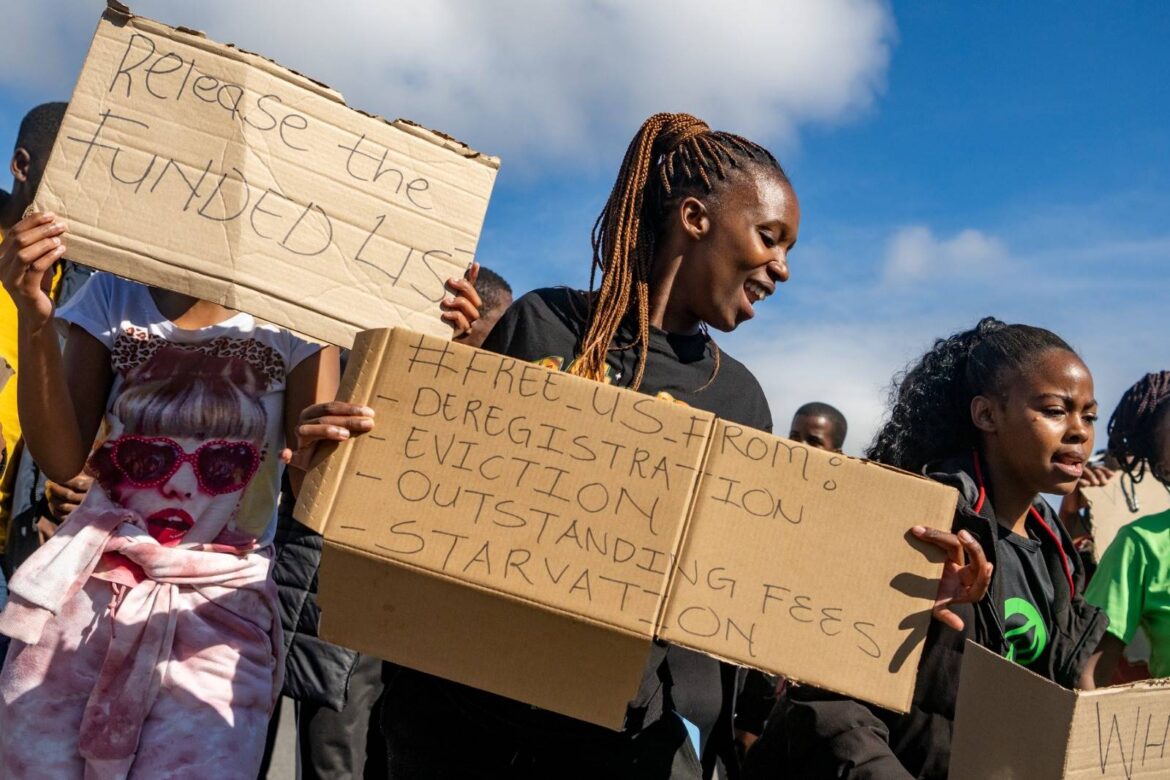As the 2025 academic year approaches, thousands of university students across South Africa find themselves grappling with the grim reality of financial exclusion. Among them is Ntyatyambo Volsaka, a 21-year-old prospective final-year BCom Law student at Wits University, who owes the institution R97,000. Volsaka, once funded by the National Student Financial Aid Scheme (NSFAS), was defunded after failing a course. Now self-funded, he faces the daunting requirement of paying at least 50% of his debt—about R45,000—before he can register for his final year.
“I am unable to register because of my debt,” Volsaka told IOL News. “I am the first person in my family to go to university, especially a prestigious university like Wits. My family is looking up to me to finish my degree and be able to provide for them because the situation is very bad at home.” With five siblings and financially struggling parents, Volsaka’s situation is dire. Despite seeking assistance from the Wits Student Representative Council (SRC) and applying for the university’s hardship fund, he has yet to receive a response.
The hardship fund is designed to assist financially needy students with up to 50% of their outstanding balance, capped at R50,000. However, for many like Volsaka, this assistance remains out of reach. He criticized Wits University for prioritizing building renovations over student financial aid. “The university has been fundraising money to renovate buildings, but they are not assisting students with financial aid,” he claimed. “They can assist us because they are getting donations from sponsors, but it’s only for rebuilding and renovations.”
Another student facing financial hurdles is Ndivhuwo Mandane, who owes R30,000 after completing his BCom Honours last year. Despite being funded by the National Research Council (NRC), which covers tuition, living expenses, and other costs, Mandane’s accommodation fees left him in debt. “My financial situation is severe because my parents are not working, and I can’t pay the amount that I owe,” he said. Like Volsaka, Mandane has applied for the hardship fund, hoping it will clear his debt and allow him to graduate and seek employment.
The issue of financial exclusion extends beyond Wits University, affecting self-funded students across the country. Many face the heartbreaking reality of being unable to register for the new academic year due to unpaid debts. Some students resort to camping outside university campuses with their belongings, hoping for assistance, often without food or shelter.
Wits University received 86,000 applications for the 2025 academic year but can only accommodate 6,000 students. This stark contrast highlights the broader crisis in higher education, where limited spaces and financial barriers prevent many qualified students from pursuing their studies. Additionally, 337,158 learners from the Matric Class of 2024 qualified for bachelor studies, but many will not be admitted to higher institutions due to these constraints.
Wits SRC President, Nombulelo Chiya, acknowledged the widespread issue of financial exclusion. “Students who cannot register because of their economic status and financial background are facing a huge challenge,” Chiya told IOL News. “They are expected to settle their outstanding debt even though they don’t have the entire amount.” Delays in the NSFAS list have further compounded the problem, leaving previously funded students unable to register.
Chiya revealed that the SRC is in discussions with university leadership to allow students owing up to R120,000 to register, provided they sign an acknowledgment of debt (AOD) if they were funded by NSFAS. Additionally, the SRC launched the Kobo Ya Thuto Legacy Fund, a fundraising campaign aimed at raising R15 million, matched by the university to total R30 million, to combat financial exclusion.
“This campaign is not just a fundraising effort but a call to action for students in financial need,” Chiya said. “We need assistance from the public and the private sector to help students. Even donations as little as R100, which can be doubled by the institution, would make a big difference in the fight against financial exclusion.”
Wits University spokesperson Tiisang Monatisa confirmed that the university can accommodate approximately 6,000 undergraduate students and manages 5,762 beds. “We understand the ongoing challenge with accommodation around our campuses and are working with external accredited accommodation providers who currently have approximately 24,512 available beds for students,” she said.
Regarding financial aid, Monatisa stated that Wits has a hardship fund to assist students from disadvantaged backgrounds. “The Wits hardship fund assists students in need to register and secure emergency accommodation, with up to R50,000 per qualifying student,” she said. The Financial Aid and Scholarships Office (FASO) provides information, services, and advice to students facing financial pressures, including guidance on bursaries and scholarship opportunities.
“In 2024, the university disbursed over R1 billion in financial aid, scholarships, and bursaries, benefiting 25,000 students and is likely to do the same this year,” Monatisa added. This includes R140 million from its Council Budget. The university also implemented a 0% increase in residence fees for this year, except for one residence.
On student safety, Monatisa emphasized that Wits prioritizes security, especially given incidents of protests, shootings, and crime in the city. “The Campus Protection Services has 24/7 CCTV surveillance coverage across all our campuses as well as mobile vehicle patrols onsite,” she said. Students have access to a 24-hour escort service on campus, particularly for those working late in libraries or computer labs.
Additionally, Wits offers the ‘Wits mySOS’ application, a free tool that helps the university community prepare for emergencies on campus. “Once the app has been downloaded, a single click of a button will prompt an emergency call to the Campus Protection Services,” Monatisa explained.
As students like Volsaka and Mandane continue to fight for their education amidst financial struggles, the call for systemic change grows louder. Both the government and higher education institutions are being urged to bridge the financial gap, ensuring that no student is left behind due to economic hardship.
